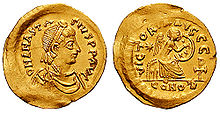Roman Emperor Anastasius I
| Anastasius I | |||||
|---|---|---|---|---|---|
| Emperor of the Byzantine Empire | |||||

Semissis of Emperor Anastasius.
|
|||||
| Reign | 11 April 491 – 9 July 518 | ||||
| Predecessor | Zeno | ||||
| Successor | Justin I | ||||
| Born | c. 431 Dyrrhachium, modern Durrës in Albania |
||||
| Died | 9 July 518 (aged 87) Constantinople |
||||
| Consort | Ariadne | ||||
|
|||||
| Dynasty | Leonid dynasty | ||||
| Full name | |
|---|---|
| Flavius Anastasius |
Anastasius I (Latin: Flavius Anastasius Augustus, Greek: Ἀναστάσιος; c. 431 – 9 July 518) was Eastern Roman Emperor from 491 to 518. His reign was characterized by substantive accomplishments, which were representative of emerging patterns of government, economy, and bureaucracy in the Eastern Roman empire. In addition, Anastasius I is known for leaving the imperial government with a sizable budget surplus due to minimization of government corruption, reforms to the tax code, and the introduction of a new form of currency.
Anastasius was born at Dyrrachium, the date is unknown, but he is thought to have been born no later than 430 or 431. He was born into an Illyrian family, the son of Pompeius (born c. 410), nobleman of Dyrrachium, and wife Anastasia Constantina (born c. 410). His mother was an Arian, sister of Clearchus, also an Arian, and a paternal granddaughter of Gallus (born c. 370), son of Anastasia (born c. 352) and husband, in turn daughter of Flavius Claudius Constantius Gallus and wife and cousin Constantina. Before becoming emperor, Anastasius was a particularly successful administrator in the department of finance.
Anastasius had one eye black and one eye blue (heterochromia), and for that reason he was nicknamed Dicorus (Greek: Δίκορος, "two-pupiled").
Following the death of Zeno (491), there is strong evidence that many Roman citizens wanted both a Roman and an Orthodox Christian emperor. In the weeks following Zeno's death, crowds gathered in Constantinople exclaiming "Give the Empire an Orthodox Emperor! Give the Empire a Roman Emperor!" Under such pressure, Ariadne, Zeno's widow, turned to Anastasius I. Anastasius was in his sixties at the time of his ascension to the throne. Religiously, he was fairly overt in his sympathy for the Monophysites. Consequently, as a condition of his rule, the Patriarch of Constantinople required that he pledge not to repudiate the Council of Chalcedon. It is noteworthy that Ariadne chose Anastasius over Zeno's brother Longinus, who was arguably the more logical choice. The decision upset the Isaurians, but it also was not appreciated by the Blues and the Greens who had been patronized by Longinus. The Blues and Greens subsequently showed a tendency to riot and cause mayhem.
...
Wikipedia
